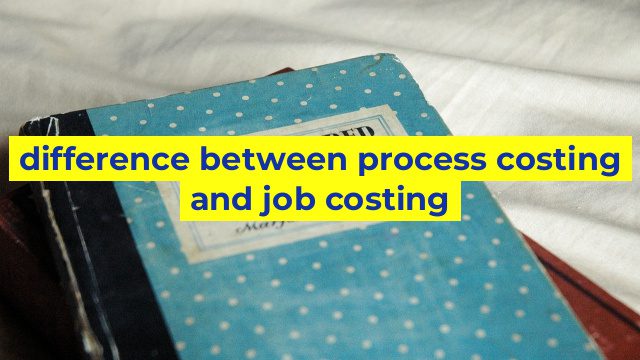Difference between Process Costing and Job Costing
Costing is an essential function in any business organization. The accuracy of costs incurred in production determines the profitability of the organization. There are two methods of costing in production; process costing and job costing. The two methods of costing differ significantly, and this article explores their differences.
What is Process Costing?
Process costing is a method of costing used in production where the products are identical and are produced continuously. This method of costing is common in industries such as oil refineries, chemical plants, and food processing plants. Process costing is a way of analyzing the cost of producing a product by looking at each stage of the production process.
In process costing, the cost of each process is calculated, and the final cost of the product is determined by summing up all the costs incurred in the various production stages. The cost per unit is calculated by dividing the total cost of production by the number of products produced.
What is Job Costing?
Job costing, on the other hand, is a method of costing used to determine the cost of producing a unique product or providing a service. Job costing requires the identification of each cost element for a specific project or job. This costing method is common in industries such as construction, electronics, and printing.
In job costing, each job or project is assigned a unique job number, and all costs incurred in the production process are tracked per job. This includes direct and indirect costs such as labor, materials, overheads, and equipment usage. The cost per unit is then calculated by dividing the total cost of the job by the number of units produced.
The Differences between Process Costing and Job Costing
The primary differences between process costing and job costing are as follows:
1. Production process – Process costing applies to continuous production processes with identical products while job costing applies to unique products or services.
2. Cost calculation – In process costing, the cost per unit is calculated by dividing the total cost of production by the number of products produced while in job costing, the cost per unit is determined by dividing the total job cost by the number of units produced.
3. Identifying costs – In process costing, the costs are identified by process or production stage, while, in job costing, the costs are identified by job or project.
4. Unit cost – In process costing, the unit cost is relatively constant, while in job costing, the unit cost varies depending on the project or job.
5. Accuracy – Job costing is considered more accurate than process costing in determining the cost of production since it tracks costs per job or project.
In summary, process costing and job costing are two different methods of costing used in production. Process costing involves continuous production of identical products, while job costing is used for unique products or services. Job costing is considered more accurate than process costing in determining the cost of production.
Table difference between process costing and job costing
| Process Costing | Job Costing |
|---|---|
| Used for products that are mass produced and identical to each other. | Used for products that are custom made and are different from each other. |
| Costs are averaged across all units produced. | Specific costs are assigned to each job or project. |
| There is only one cost pool for all products. | There are multiple cost pools for different jobs or projects. |
| Costs are assigned to departments or processes. | Costs are assigned to individual jobs or projects. |
| Suitable for industries such as oil and gas, chemicals, and food processing. | Suitable for industries such as construction, custom manufacturing, and consulting. |


